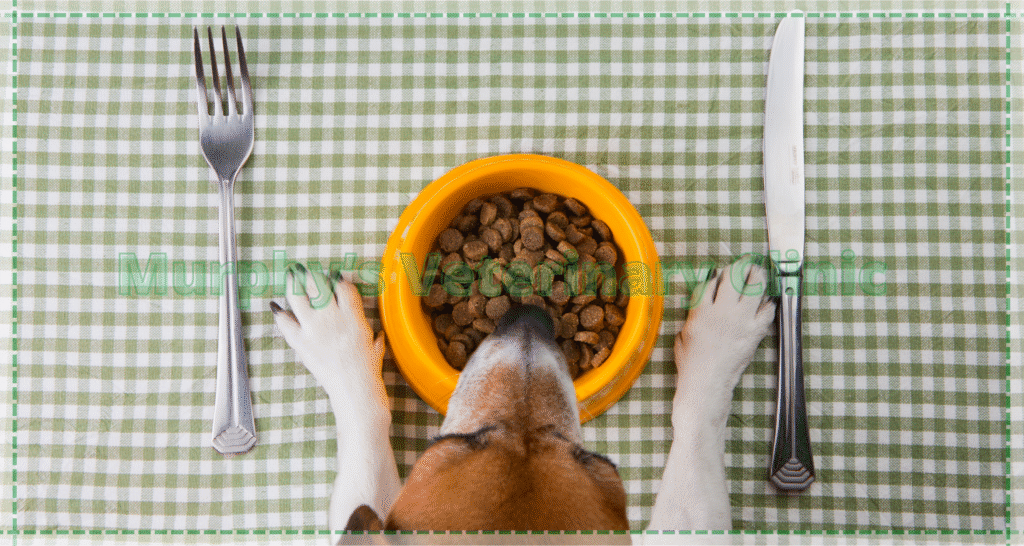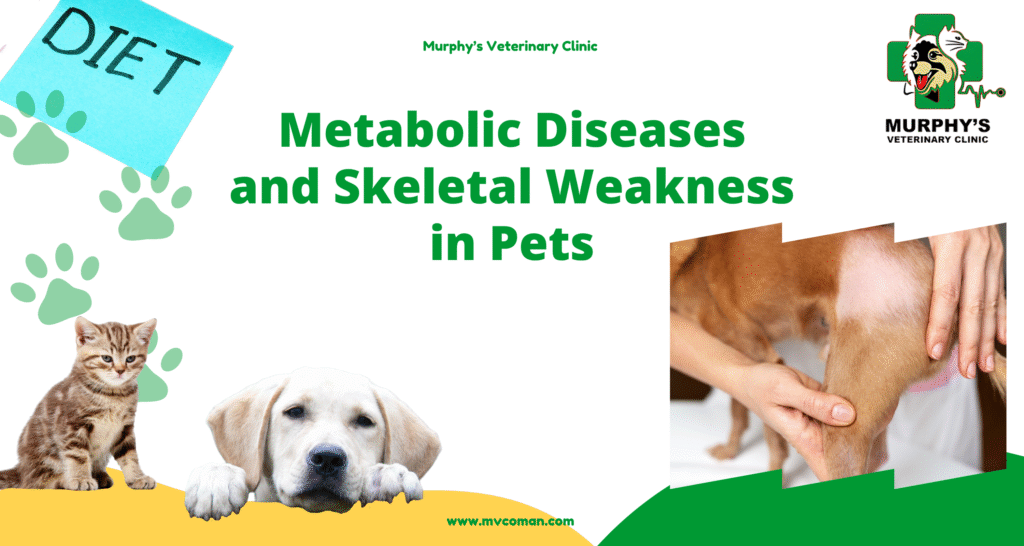Diseases & Treatments, Health & General Care, Nutrition & Diet
Metabolic Diseases and Skeletal Weakness in Pets
Topics covered in this article:
- Calcium Deficiency and Its Impact on Skeletal Weakness in Pets
- Thyroid Disorders and Skeletal Weakness in Pets
- Kidney Problems and Skeletal Weakness in Pets
- Lack of Sunlight Exposure and Its Role in Metabolic Diseases and Skeletal Weakness
- Imbalanced Diets and Metabolic Diseases and Skeletal Weakness
- Conclusion
Metabolic diseases and skeletal weakness in pets are among the critical challenges in maintaining their health and quality of life. These conditions include issues such as calcium deficiency, thyroid disorders, kidney problems, and vitamin D deficiency, all of which can significantly affect bone strength and skeletal structure. Pets with imbalanced diets or insufficient exposure to sunlight are at a higher risk of developing these issues. Early diagnosis and proper management of metabolic diseases and skeletal weakness in pets can prevent severe orthopedic complications. This article will explore the key factors and consequences of metabolic diseases and skeletal weakness in pets and introduce prevention and treatment strategies. Awareness of this topic helps pet owners ensure the well-being of their pets.

Calcium Deficiency and Its Impact on Skeletal Weakness in Pets
Calcium deficiency is one of the leading causes of bone softening and spontaneous fractures in pets. Imbalanced diets lacking adequate calcium gradually reduce bone density, making pets more susceptible to severe skeletal injuries. Metabolic diseases and skeletal weakness in pets, if not properly managed, can lead to bone deformities and chronic pain.
- Poor Dietary Choices
Containing low levels of calcium, failing to meet daily nutritional needs. - Imbalanced Calcium-Phosphorus Ratio
Excess phosphorus leads to calcium depletion from bones. - Age and Breed Sensitivity
Young pets and specific breeds are more vulnerable to calcium deficiency. - Long-term Complications of Calcium Deficiency
Including bone softening, muscle weakness, and recurrent fractures.
Hypervitaminosis A and Its Impact on Skeletal Weakness in Pets
Excessive intake of vitamin A, known as hypervitaminosis A, can lead to serious bone and joint problems in pets, particularly in young and growing cats. High levels of vitamin A disrupt the normal metabolism of bones, causing abnormal bone growth, joint stiffness, reduced flexibility, and chronic pain. In kittens, this condition can be especially dangerous, and if left undiagnosed, it may result in permanent bone deformities and a severe decline in quality of life. One of the most common causes is overfeeding with vitamin A–rich foods such as liver. Many pet owners mistakenly believe that raw or cooked liver is a healthy treat for kittens, not realizing that frequent consumption can cause toxicity and irreversible damage. To prevent these skeletal complications, balanced nutrition and avoidance of excessive vitamin A sources are essential.
Excessive Vitamin A Intake from Diet
Feeding vitamin A–rich foods frequently or in large quantities.
Disruption of Normal Bone Growth
Leads to abnormal bone formation, joint stiffness, and reduced mobility.
High Risk in Young Cats
Kittens are most affected and may develop permanent skeletal deformities.
Chronic Pain and Reduced Quality of Life
Ongoing discomfort caused by irreversible skeletal changes.
Examples of High-Risk Vitamin A–Rich Foods
- Beef or lamb liver (raw or cooked) – the most common source of hypervitaminosis A.
- Fish liver oil (such as cod liver oil) – among the richest sources of vitamin A.
- Chicken liver – smaller in size but still high in vitamin A.
- Certain commercial pet foods with a high percentage of liver or fish liver oil.
- Homemade treats made with liver or liver purée – even small amounts, if given frequently, can be harmful.

Thyroid Disorders and Skeletal Weakness in Pets
Thyroid disorders such as hypothyroidism and hyperthyroidism disrupt the body’s metabolic balance, leading to decreased bone density. Pets suffering from these conditions are at a high risk of skeletal deformities and overall skeletal weakness. Monitoring thyroid hormone levels is crucial for the timely diagnosis of metabolic diseases and skeletal weakness in pets.
- Hypothyroidism and Slowed Bone Metabolism
Reduces bone regeneration and weakens skeletal structure. - Hyperthyroidism and Rapid Bone Breakdown
Increases bone resorption and decreases bone density. - Role of Thyroid Hormones in Calcium Regulation
Disruption leads to calcium loss from bones. - Importance of Periodic Hormonal Tests
For preventing severe skeletal complications.

Kidney Problems and Skeletal Weakness in Pets
Kidney diseases disrupt the calcium-phosphorus balance, directly affecting bone health. Pets with kidney issues struggle with phosphorus excretion and calcium absorption, which significantly contributes to skeletal weakness.
- Elevated Phosphorus in Kidney Failure
Triggers parathyroid hormone release, leading to bone degradation. - Reduced Calcium Reabsorption in Kidneys
Causing low blood calcium levels and bone softening. - Role of Active Vitamin D in Kidneys
Impairment in its production results in skeletal weakness. - Regular Monitoring of Kidney Functions
Essential for early detection and management of skeletal damage.

Lack of Sunlight Exposure and Its Role in Metabolic Diseases and Skeletal Weakness
Insufficient sunlight exposure leads to vitamin D deficiency in pets. This deficiency hampers calcium absorption, paving the way for skeletal weakness in pets. Pets kept indoors are especially prone to this problem.
| Risk Factor | Impact on Skeletal Weakness in Pets |
| Vitamin D Deficiency | Reduced calcium absorption and bone softening |
| Indoor Living Conditions | Decreased skin synthesis of vitamin D |
| Long-haired Breeds | Reduced sunlight effectiveness on skin |
| Absence of Vitamin D Supplements | Increased risk of spontaneous fractures |

Imbalanced Diets and Metabolic Diseases and Skeletal Weakness
Poorly balanced diets lacking essential minerals and vitamins are major contributors to metabolic diseases and skeletal weakness in pets. Consuming low-quality commercial foods or homemade diets without veterinary supervision disrupts the delicate balance of critical nutrients.
| Type of Diet | Impact on Skeletal Weakness in Pets |
| Low-quality Commercial Foods | Lacking adequate calcium and vitamin D |
| Homemade Diets Without Supplements | Leads to mineral deficiencies and bone softening |
| Breed-specific Diets | Requires precise planning to meet calcium and phosphorus needs |
| Monotonous Diets | Causes imbalances in mineral levels, harming bone structure |
Conclusion
Metabolic diseases and skeletal weakness in pets are conditions that, if neglected, can result in irreversible complications such as recurrent fractures and permanent bone deformities. Pet owners’ awareness of contributing factors plays a crucial role in the prevention and timely treatment of these problems. A balanced diet, adequate sunlight exposure, regular monitoring of kidney and thyroid functions, and periodic blood tests and imaging are essential measures for managing metabolic diseases and skeletal weakness. Regular veterinary visits and receiving tailored nutrition plans can prevent severe skeletal issues and enhance the quality of life for pets.
Murphy’s Veterinary Clinic, equipped with advanced diagnostic tools and a specialized veterinary team, offers comprehensive services for diagnosing and treating metabolic diseases and skeletal weakness in pets. The clinic provides precise blood tests, advanced imaging, and customized nutritional plans to address each pet’s unique needs. Visiting Murphy’s Veterinary Clinic ensures proactive care, preventing serious skeletal complications and safeguarding your pet’s bone health.



Pingback: Orthopedic Issues in Pets: Causes and Solutions - MURPHYS Veterinary Clinic